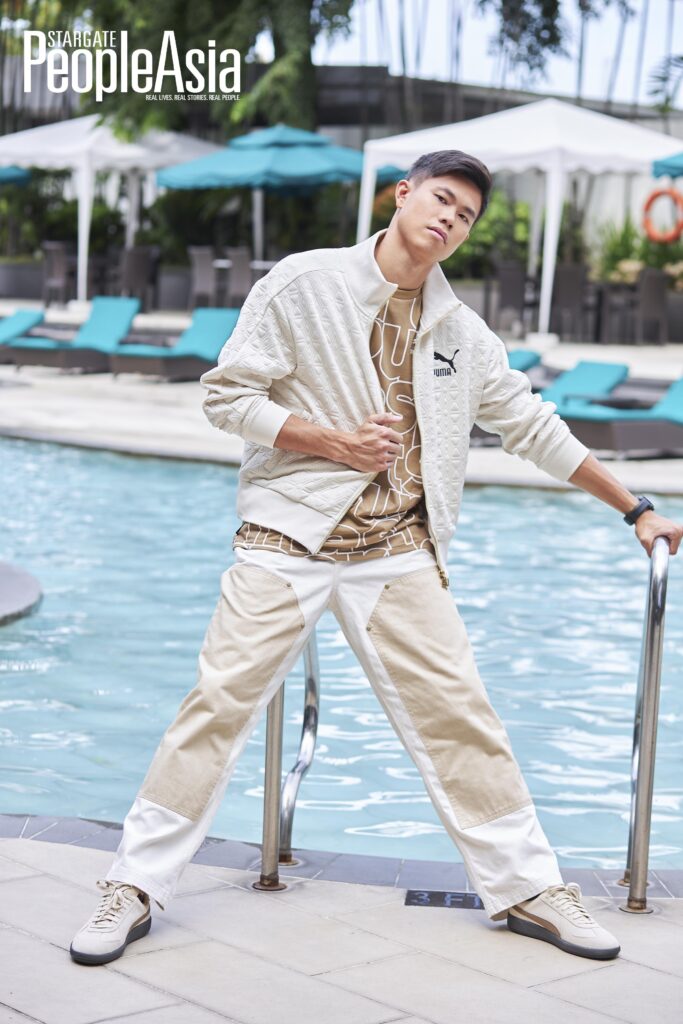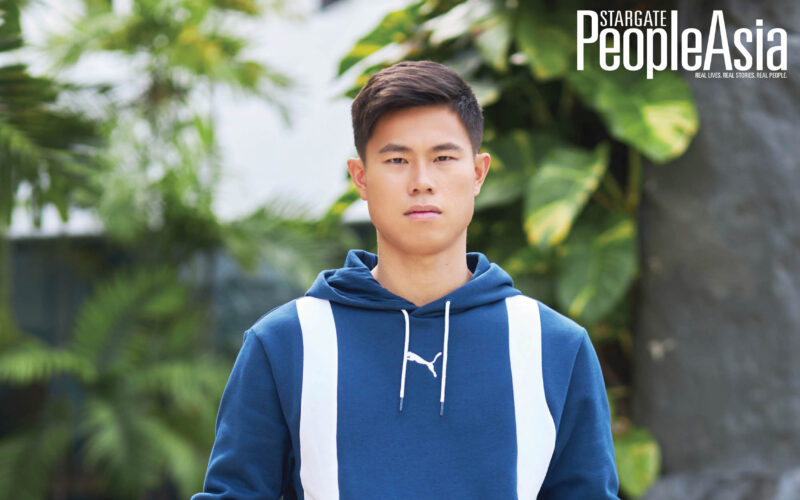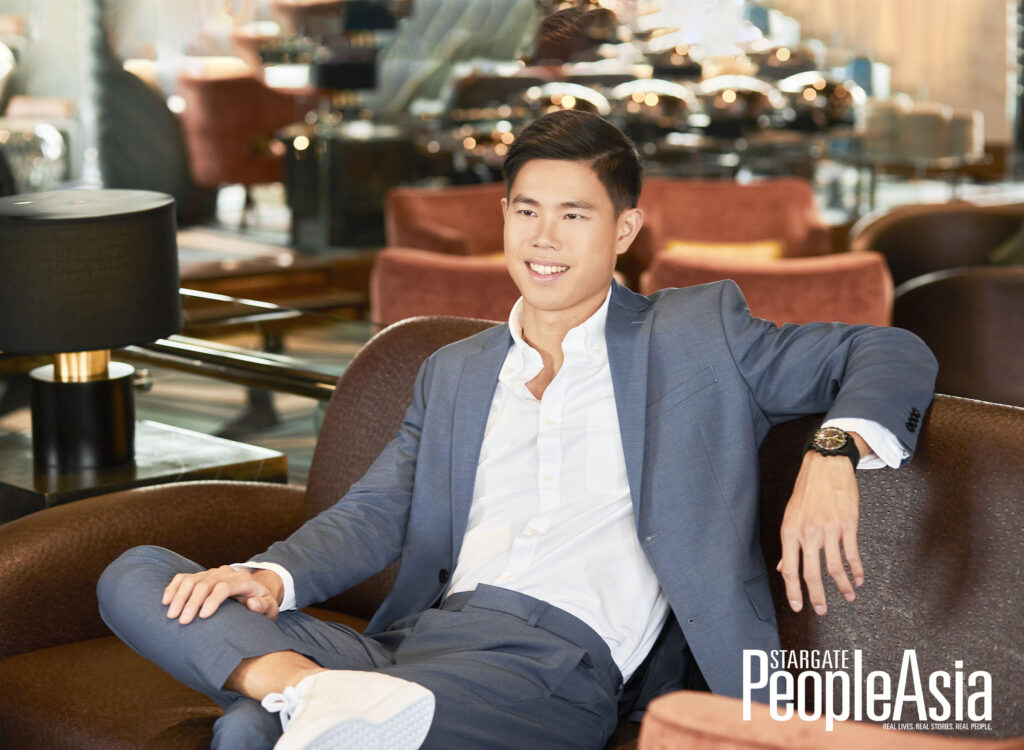BY JOYCE REYES-AGUILA
As he sets his sights on Paris 2024, the world’s Number 2 pole vaulter, who recently cinched the Philippines’ first gold medal for the sport at the 19th Asian Games last September, inspires not just a new generation of athletes, but an entire nation.
Victory is the only outcome Ernest John “EJ” Uy Obiena is set on. The Filipino Olympic pole vaulter has been flying high in the sport in recent years.
In 2023 alone, EJ has brought home the following for the Philippines to date: the Philippines’ first gold medal for pole vaulting in the Asian Games last September, a gold medal from the Southeast Asian (SEA) Games in May and the Asian Championships in June, and a silver medal from the World Championships in August.
As of this writing, he is ranked second in the sport, according to the World Athletic Association.
It’s quite an exhaustive list of accomplishments for someone who was actually not interested in pole vaulting when he was younger, despite being born to track and field athletes Emerson Obiena and Jeanette Uy. EJ’s sister, Emily Jane, is also a pole vaulter. As a toddler, he frequented the Rizal Memorial Stadium in Manila where his father also trained.
So how did it all add up?
“My dad’s doing it, so I wanted to do it,” he explains to PeopleAsia.
“It’s pretty much like I’m following the footsteps of my dad. Every kid’s hero pretty much is his or her dad.” He would take up the sport eventually, alongside other track and field events and basketball.
Emerson coached his son until he was 18, a phase in his career EJ describes as “hard.” He shares, “I don’t think I would ever want to coach my own kid because of that. Don’t get me wrong. He did what we could and I totally am thankful for everything that my dad has done. But I think the line between coach and father should never be blurred, especially to a kid.” Still, he took the lessons his father imparted to heart, understanding from a very young age that if he wanted to be the best, he needed to “outwork everyone else.”
EJ represented the University of Santo Tomas in college as a student athlete on a scholarship. It was during this time that he met Ukrainian pole-vaulting legend Sergey Bubka, his sports god in his younger years.
“He’s unthinkable,” he says. “He made the sport what it is now. Back in the day, all I wanted was his autograph because he’s the greatest of all time at that stage of his life. It was an amazing experience for a kid growing up in a small country where our national record is literally a meter short than most of the dominant figures in my event. He changed the game to a totally different level.”
It was through Bubka, who was inducted into the International Association of Athletics Federations Hall of Fame (IAAF), that EJ learned of a training opportunity in Italy. All he had to do was clear five meters at a time when he was jumping 4.95. When he did, he was bound for Italy, where EJ trained under Vitaly Petrov, Bubka’s former coach and EJ’s coach since 2014.
Breaking records
By mid-2014, EJ set the national pole vault record with a 5.01-meter jump at the weekly relays of the Philippine Athletics Track and Field Association (PATAFA). “I’ve broken the Philippine junior records multiple times but never the open division,” he says. “So, it’s my first national record per se.”
A week later, EJ registered 5.05 meters, and repeatedly broke his records clearing the bar at 5.15, 5.20, and 5.21 meters in the next weeks. “It felt surreal, jumping over five meters, and improving on the national record,” he shares. “Growing up, that was the goal of my dad. All he wanted me to do was to break that five-meter barrier. We finally were able to achieve that earlier than expected. I was definitely ecstatic.”
The next years would see EJ win a silver medal at the Southeast Asian Games in 2015, and a gold medal in the Philippine National Games in 2016. An interior cruciate ligament (ACL) injury before the 2017 SEA Games sidelined him for six months, but the Olympic dream kept him going. He won a gold medal in the Summer Universiade and earned a ticket to the 2020 Summer Olympics with a 5.81-meter leap in Italy in 2019. He was unable to advance to the final round of the World Athletics Championship after placing 15th among 35 competitors.
EJ closed 2019 strong and struck gold at the SEA Games in Tarlac, where he set a new SEA Games record of 5.45 meters. He spent time in China to train before returning to Italy. Then the COVID-19 pandemic struck, hitting Italy hard, and limiting his training and competitions.
“It was very weird (to train at that time),” he reveals. “You are training for something you do not know. You’re preparing for something and you don’t know when it’s going to be. You don’t know if it’s even going to happen. It was an odd feeling because as athletes, we tend to aim for certain competitions before the year starts. That’s what we are preparing for. All the things lead up to that. And there were so many uncertainties being in a foreign country where I am practically alone without my family during COVID. It was tough. The next thing I knew, the Olympics was postponed and everything was up in the air.”
He credits Vetrov, who also coached legendary pole vaulters Yelena Isinbaeva and Giuseppe Gibilisco, for helping him through his pandemic struggles. “I really have a good coach who really understands the way I think,” he says of the Ukrainian. “He gets me for being me. He told me the right things. I was able to stick with it, continue, and pursue what I need to do.”
Vetrov reminded EJ of his “whys” when it “got really tough,” the athlete admits. “Don’t look too far ahead. You’re an athlete and your job is to be a better athlete. That’s progress, constant improvement. And that’s just what I focused on because athletes are like machines that need to be programmed to do something. If we don’t aim for something, then we’re probably going to end up just a mess. Everybody will be if you don’t have a goal, if you don’t set your sights onto something.”
The pole vaulter did not compete for months due to lockdowns and all. In August 2020, he was back on track at the 13th Triveneto Meet in Trieste, Italy. EJ placed second behind Olympic champion Thiago Braz of Brazil, whom he trained with.

all from Puma
Paris
A year after Trieste, Obiena landed in Japan for the Tokyo Olympics. He failed to clear the 5.80-meter mark and advance. EJ considers it his most memorable defeat.
“Tokyo asked me to question my ability to compete at that big a stage,” he confesses. “It was almost a test. When I failed there, I wanted to stop. I felt that I probably did not have it in me. There are certain traits that an athlete should have and I did not have those in Tokyo. I said to myself I’m going to be wasting my time, my coach’s time, my team’s time and the funding I receive from the taxpayer’s money if I can’t do what I set out and promised them to do.”
Compounding matters for EJ and team, Vetrov faced some accounting inquiries from PATAFA in 2021. An investigation by the Philippine Olympic Committee proved the allegations untrue and some Philippine senators described the incident as a form of harassment of EJ.
Since then, his achievements have brought a slew of offers from other countries to change his citizenship. “What’s going to happen to the country if all the greats have issues with a certain bureaucracy and decide to leave?” he says adamantly. “If I leave, there will be nations who will welcome me. I’m definitely going to be supported. But aren’t you a Filipino in the first place? Aren’t you born a Filipino?
“There are many reasons why I’m good at what I do. One of those is because I grew up here and I was molded by this nation. So why not fight for the people or the country that built me? And then the whole fiasco that happened to me last year kind of molded me a little bit more. It asked me the question why, especially since it is more financially rewarding to compete for other nations.”
EJ says the 2024 Olympics in Paris “is the goal and target” for him. “In Tokyo, I was tired. I came out to win and was not able to do it. I (thought that the sport was) not for me. If I can’t then I would be brutally honest and face reality. I wanted to stick around and try Paris because I felt like I failed in 2020. I was ready to go. But God had different plans. I realized that there are certain things that I can’t control that should be done in a certain way. I need to focus on my craft, learn a lot. My priority right now is to do what I need to. I don’t want to make a mistake in Paris.”
During his recent trip home, EJ secured financial support from the private sector to aid him in his preparations and even advocacies. He says that he will now have less worries in terms of more comfortably traveling (less budget airlines and sitting in cramped spaces for six hours) with his team and transporting his equipment.
In early 2023, EJ declined offers of support from private citizens who wanted to send him money after he announced that financial constraints made him decide to miss the Asian Indoor Athletic Championships. He explained in interviews that he did not want to “double-charge” citizens who were already supporting him as tax payers.
EJ only has gratitude for Filipinos. “I want to thank them for all the things that they have done, and for following his journey. It’s never been smooth. We have tons of failures, heartbreak and battles that we needed to go through. Thank you for sticking around and making this fight worthwhile.”
Section Obiena
EJ shared some heartwarming messages he received on social media last October, including one from Cabanatuan City, where a school named a section after him. “It was incredible,” he says. “You can’t even imagine that growing up. The first thing is that it’s very satisfying to be in this position but next thing is like ‘Whoa! there’s a group of people who probably will be the next generation who studies in a school inspired by you.’ That’s scary because what if I don’t set the right example? It’s good and bad.”
He says one good thing about being an athlete is getting sponsors to help him with advocacies, such as taking care of the health of a group of children in Porac, Pampanga via a partnership with a hospital and a financial firm. He also auctioned off some pieces of equipment that were part of his victories to raise P1 million and build training pits for pole vaulters in the country. “I want to give more access,” he shares. “Right now, there’s very little landing area where it’s suitable for kids to even try to pole vault. There’s a huge spike in interest but not a huge spike in accessibility, and it’s futile. And what I am doing right now is to hopefully improve the sport, raise money and buy landing areas for the kids — hopefully mostly outside of Manila. I want to help as much as I can but I’m still very limited as to what I can do.”
EJ believes that there is no other medium that can unite the world the way sports does. “It’s such a great tool to unify a nation. There’s a lot of studies that say having these superstars winning World Cups boost the nation’s economic growth. I do believe that it’s for a single reason: inspiration. To inspire a nation is truly an amazing feat and truly an incredible position to be in. And I don’t think there are lots of other corners in life where you can do that other than being an athlete or being in sport,” he concludes.
Photography by Rxandy Capinpin
Art direction by Dexter Francis De Vera
Styling by Nasia Cammayo, Assisted by Nina Quintos
Grooming by Czari Nolasco and Shasha Tagud
Shot on location at Diamond Hotel Philippines






